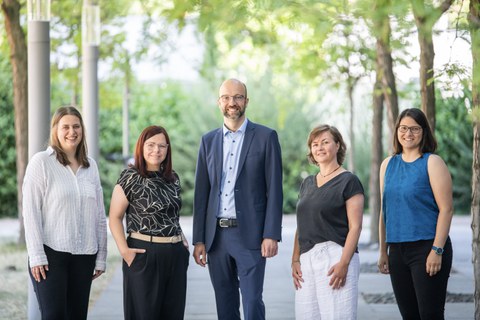Chair of Communication - Science and Technology Communication
 © Sven Ellger, TUD
© Sven Ellger, TUD
Prof. Dr. Sven Engesser
Chair of Communication - Science and Technology Communication
Send encrypted email via the SecureMail portal (for TUD external users only).
Institut für Kommunikationswissenschaft
Institut für Kommunikationswissenschaft
Visiting address:
Bürogebäude Zellescher Weg, 2. Etage, Raum A255b Zellescher Weg 17
01069 Dresden
Office hours:
- Monday:
- 10:30 - 12:00
Consultation arrangement by mail to Doreen Brauer, engesser-sekretariat@tu-dresden.de
Consultations with Prof. Engesser take place after prior arrangement by email to in room BZW/A255B.
Sven Engesser’s research explores how complex topics – such as science, technology, politics, environment and health – are communicated and understood. He is particularly interested in how perceptions, emotions, and trust shape the ways people engage with uncertainty, innovation, and societal challenges. His work bridges science communication, human–machine communication, and political communication, with a focus on how communication processes influence public understanding and decision-making.
He has a strong interest in interdisciplinary collaboration and works at the intersections of social sciences, humanities, medicine, natural sciences, and engineering sciences. His publications reflect this broad approach, appearing in leading journals across multiple disciplines, including Global Environmental Change, Journal of Cleaner Production, Journal of Communication, Political Communication, Argumentation, First Monday, and Human-Machine Communication. He has led or co-led numerous projects funded by the DFG, BMBF, and the EU’s Horizon 2020.
| 01/2026 – 12/2032 | REC² – Responsible Electronics in the Climate Change Era
(Cluster of Excellence funded by the German Research Foundation (DFG) together with coordinator Y. Vaynzof and other PIs) |
| 03/2022 – 02/2026 | MI-EOCRC – Microbiome-Based Prevention of Early-Onset Colon and Rectal Cancer (Funded by the German Federal Ministry of Education and Research (BMBF) together with coordinator S. Zeissig and other PIs) |
| 10/2021 – 10/2025 | DIPCY – Disruptions of Networked Privacy (Funded by the DFG’s Excellence Strategy together with S. Wagenknecht, J. Möller, and S. Köpsell) |
| 07/2019 – 07/2024 |
ETAC – Ethical Implications of the Tactile Internet (Funded by the DFG’s Cluster of Excellence CeTI – Centre for Tactile Internet with Human-in-the-Loop together with M. Schmauder, G. Grübler, and L. Hagen) |
| 02/2021 – 05/2021 | SAMT – Voice-Based Assistants: Media Diversity and Transparency (Funded by the Media Authority of North Rhine-Westphalia (LfM) together with J. Möller) |
| 02/2019 – 01/2022 |
PaCE – Populism and Civic Engagement (Funded by the EU’s Horizon2020 together with coordinator B. Edmonds and other PIs) |
| Since 12/2023 |
Member of the Committee for Responsibility in Science at TUD |
| Since 09/2022 | Member of the Department Speculative Transformation at TUD |
| 03/2019 – 05/2022 | Member of the Boysen TU Dresden Graduate School |
Academic Positions
| 2017 - Present |
Chair of Media and Communication with focus on Science and Technology Communication |
| 2010 – 2017 |
Senior research and teaching associate |
| 2006 – 2010 | Research and teaching assistant Department of Communication Science and Media Research, LMU München |
Education
| 2012 |
PhD |
| 2006 |
MA |
| Katrin Etzrodt | Voice-Based Assistants as Social Actors (2017 – 2022) |
| Lisa Weidmüller |
The Trustworthiness of Voice-Based Assistants as Information Intermediaries (2017 – 2025) |
| Dan Teng’o | From Stakeholders to Storytellers: A Multilevel Analysis of Climate Change Framing in Kenya (2017 – 2025) |
| Stephen Tindi | Digital Transformation and Digital Inequality in Ghana (2018 – 2025) |
| Teresa Lindenauer | Populist Narratives in Public Communication (since 2019) |
| Ayanda Rogge | The Portrayal of Artificial Companions in Science Fiction (since 2019) |
| Nassim Ghondaghsaz | Trust in Sofware-Defined Supply Chains (since 2019) |
| Deborah Kunze | Destigmatization through Media and Communication (since 2020) |
| Pauline Heger | The Social Acceptance of Green Innovation in Urban Spaces (since 2023) |
- Science and technology communication, BA lecture
- Introduction to the German media system, BA lecture
- Various theory and research seminars at BA and MA level
| 2019 - Present |
Global communications. Open Book Publishers (mit M. Brüggemann, C. Richter, M. Lim, M.-S. Frère & I. Bachmann) |
| 2017 - Present | Studies in international, transnational and global communications. Springer VS (mit C. Richter, M. Brüggemann & S. Fengler) |
-
Barth, K. (2025, July). "Totaler Wahnsinn": Hitze in den Medien. [„Completely insane”: The media coverage of heat waves] WDR 5: Töne, Texte, Bilder.
-
Schön, S. (2024, August). Wenn sich Trolle, Bots und Doppelgänger auf die Wahl vorbereiten [When trolls, bots, and doppelgangers prepare for the election]. Sächsische Zeitung
-
„Dienstags direkt“ (2024, March). Zwischen Algorithmen und Empathie: Wie sozial ist KI? [Between Algorithms and Empathy: How social is AI?]. MDR Sachsen: Das Sachsenradio.
-
“Scobel” (2023, November). Wie viel Macht der Wissenschaft? [How Much Power to Science?]. 3sat.
-
Beuting, S. (2021, August). Falsche Ausgewogenheit: Wenn Medien die Balance verlieren [False Balance: When Media Lose Their Balance]. Deutschlandfunk: Nach Redaktionsschluss – Der Medienpodcast.
-
Kraske, M. (2021, April). Verzerrte Darstellung. journalist
-
Rodemann, J. (2020, Dezember). 30 Sekunden für die Polarschmelze. Süddeutsche Zeitung
-
Mundus, J. (2020, März). Interview: Auch in der Corona-Krise: Ehrlich bleiben! Sächsische Zeitung
-
Hoffmann, M (2019, November). Interview: Effektive Kommunikation: Warum die E-Mail noch lange nicht tot ist Spiegel Online
-
Mundus, J. (2019, Oktober). Interview: Beine statt Auto. Sächsische Zeitung
-
„Dienstags direkt“ (2018, September). Zuhören, streiten, ignorieren? Wie sollten wir mit den Rissen in unserer Gesellschaft umgehen? MDR Sachsen - Das Sachsenradio
-
Paul, M. (2018, Juli). Interview: Warum man Fakten und Meinung trennen sollte. MDR Sachsen-Anhalt
-
„Dienstags direkt“ (2018, Juni). Die Gewalt der Sprache: Wenn Worte sprachlos machen. MDR Sachsen - Das Sachsenradio
-
Tominski, K. (2018, Juni). Interview: Wirkung sozialer Netzwerke weder über- noch unterschätzen. MDR Sachsen - Das Sachsenradio
-
Engesser, S. (2018, April). Why “Black Panther” is useful for countering populism. Euronews
In addition to the information provided on our main page, we expect you to follow these recommendations (German) when writing your thesis (in the Bachelor's or Master's program) at the Chair of Technology and Science Communication.

Sven Engesser und sein Team (f.l.t.r.): Deborah Kunze, Katrin Etzrodt, Doreen Brauer and Lisa Weidmüller. Not in foto: Ayanda Rogge (on maternity leave)
